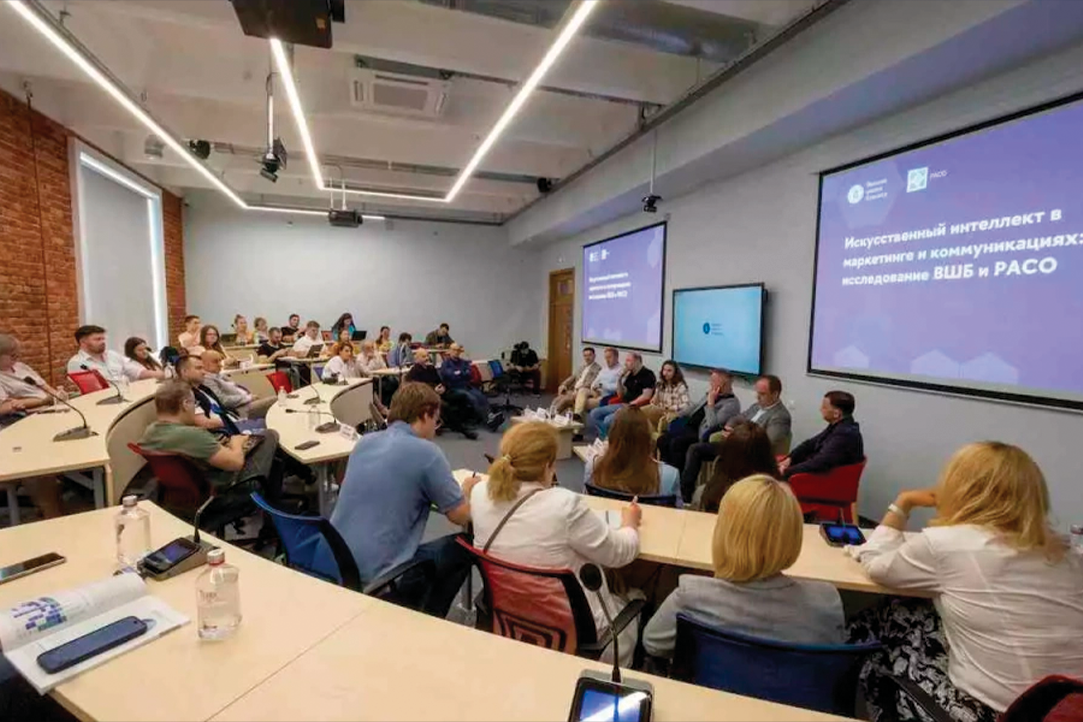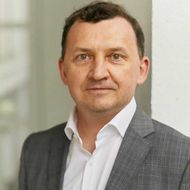Results of a joint survey on AI in marketing by the HSE Graduate School of Business and RASO

Over 400 marketing and PR directors and mass communication specialists from 46 regions of Russia took part in the survey on artificial intelligence in marketing and communications.
According to the survey results, 85% of respondents stated that they use artificial intelligence in their daily activities on a regular basis, 11% plan to use it, and only 4% do not use it. At the same time, 40% of respondents are going to take advanced training courses on working with AI systems. And 67% are sure that some of their work functions can and should be outsourced to neural networks and are not afraid that AI will completely replace them. 31% of respondents use exclusively Russian neural networks, while 19% use exclusively foreign ones. At the same time, exactly half of the respondents use both foreign and domestic systems. Over 60% of respondents use artificial intelligence capabilities to generate texts and images. When professionals needed to generate images, the most demanded task for neural networks was the preparation of new images according to a specific request. When ones worked with texts, it was writing simple texts.
The presentation of the results of the joint research of the HSE Graduate School of Business and the Russian Association for Public Relations (RASO) "Artificial Intelligence in Marketing and Communications" took place at the GSB campus. More than 50 experts gathered to discuss current practice and prospects of using AI tools to effectively solve marketing tasks. The panel discussion participants were welcomed by Vera Rebyazina, Deputy Director of the Higher School of Business at the National Research University Higher School of Economics and Evgeny Minchenko, President of RASO.

"In the work of our business school, neural networks already perform about 80% of the tasks of generating images for the media. But we are not yet able to put the texts on the artificial intelligence. This practice of AI application gave birth to the idea of a large-scale research covering 14 key sectors of the Russian economy with geography from Crimea to Sakhalin, implemented in partnership with RASO", said the moderator of the meeting Andrey Sharomov, PR-director of the HSE Graduate School of Business .
Leonid Homeriki, chairman of the RASO Digital Communications Committee, founder of content marketing agency PR Company, noted that the study revealed important trends in the development of the industry. "We expected that the percentage of public relations and marketing professionals using neural networks on a regular basis is around 60 %, but in the end we saw an impressive figure of 85 %," he said. According to him, the study confirms that the goal set by the President of the Russian Federation on mass introduction of artificial intelligence technologies in all sectors in the current decade is being actively fulfilled in the sphere of marketing communications.
"For us, as a technology vendor, such research is extremely important. We see a qualitative result and a texture that we can use to develop GigaChat," said Polina Grishina, Head of GigaChat Business Development, SberDevices. She spoke in detail about the structure of Sber's neural network model, the peculiarities of modern AI services, and also touched upon the prospects for the development of generative models up to the AGI (Artificial General Intelligence) stage. With the development of this trend, neural networks will have the ability both to analyse information, and also to think and act in a way similar to human general intelligence.
Sergey Skripnikov
Director of Public Relations at UC RUSAL
"One of the characteristic features of disrupting technologies that turn the world upside down is that they seem very imperfect to experts at the entrance. This was the case with the mp3 file: audiophiles said that the sound quality was completely unacceptable, but after the mp3 players, development took off — and completely changed the entertainment industry. As far as neural networks are concerned, the avalanche has already started; integration with business is inevitable. AI can already do a lot of things that can relieve specialists in routine operations, but we are often hindered by psychological barriers," says Sergey Skripnikov, Director of Public Relations at UC RUSAL.
Dmitry Komendantov, public sector director at VK, pointed out to his colleagues that it is important to train and educate employees, but also — on the part of companies — to give opportunities to apply these technologies and modernise established processes with reliance on AI tools. "There is no need to demonise or, on the contrary, idealise AI. Of course, the results obtained with the help of neural networks should be checked and critically evaluated by a human being," emphasised Dmitry Komendantov. He also noted that now the possibilities of artificial intelligence are not fully utilised, and the potential of the technology is much wider. Thus, assistants based on neural networks can be useful not only for automating routine tasks, but also for solving more complex tasks: research, analytics or developing marketing strategies.
"AI is a tool that is already changing the world, and ignoring it is not advisable for successful business development" shared his opinion Sergey Ivakin, a well-known marketer, was unanimously agreed with by other experts on the panel. He warned against an overly emotional attitude to this topic: at this stage, AI is not developing as a replacement for humans, but as a technology that facilitates the solution of tasks initiated by "natural" intelligence.

The audience was also actively interested in various aspects of the impact of neural networks on the quality of student training. "HSE University is the first university that not only allowed but also welcomed the use of AI technologies in the preparation of student papers. Undoubtedly, this practice should be regulated, that is why HSE University is going to prepare for the adoption of the Code of Ethics for the use of AI in education," Andrey Lavrov, Senior Director for Communications at HSE University, shared the university's plans.
The HSE Graduate School of Business continues to actively develop as an expert platform for presentation of applied research results on the most relevant topics and networking of business leaders.
The project was supported by leading marketing publications, large communities of communications and AI professionals: TenChat — the general info-partner of the project, AdIndex, Digital Ocean, PR Company content marketing agency, PRESSFID journalistic enquiry service.
